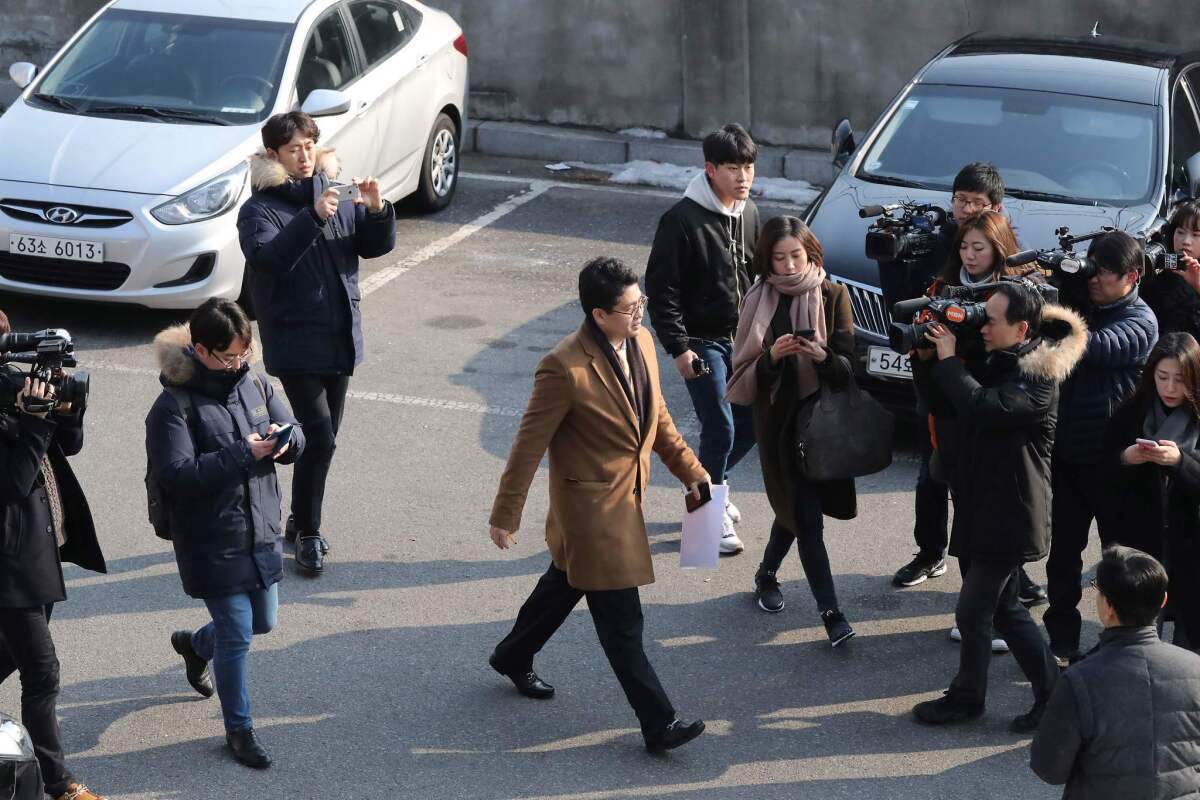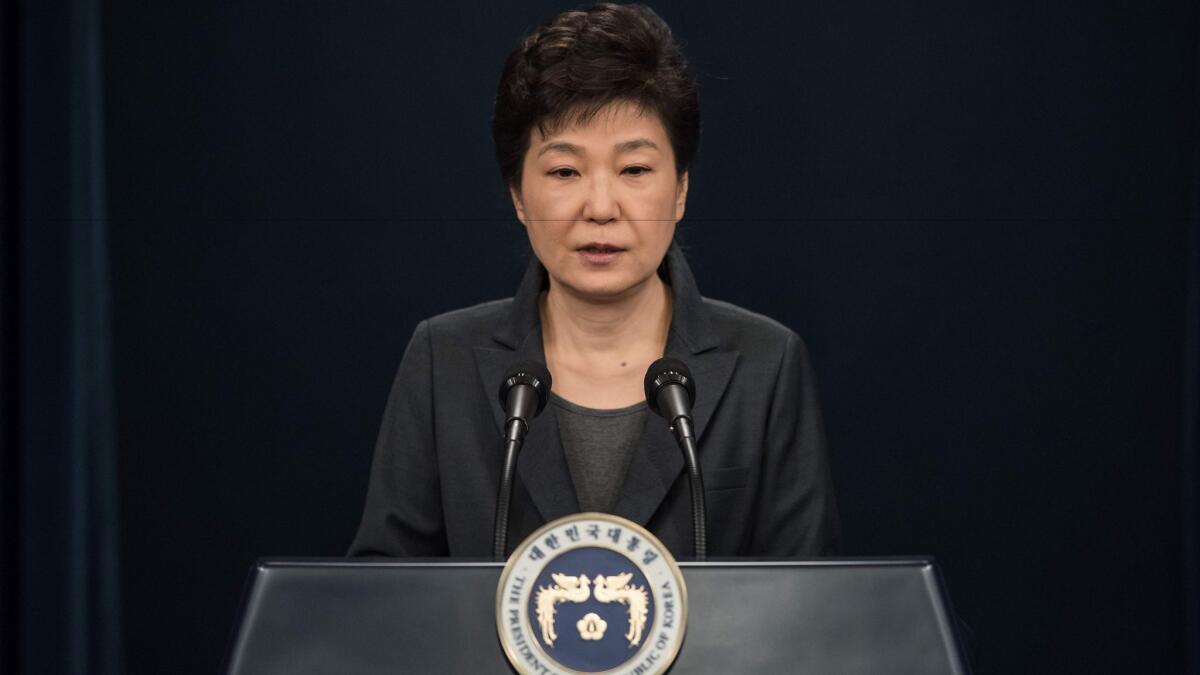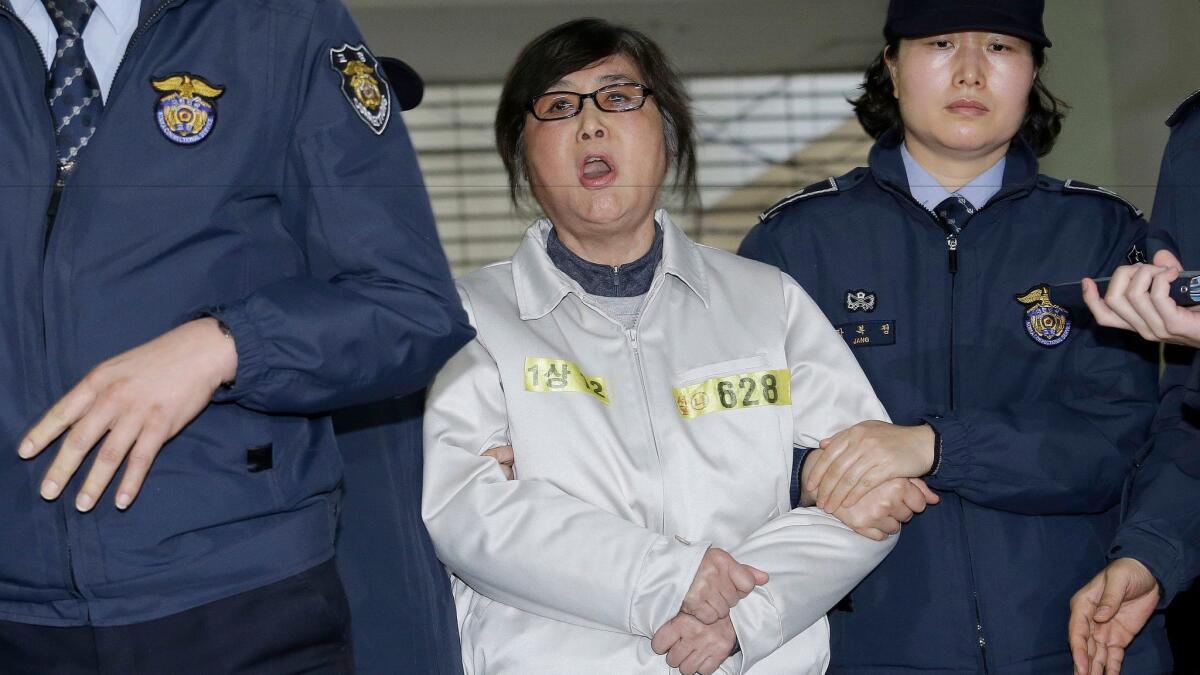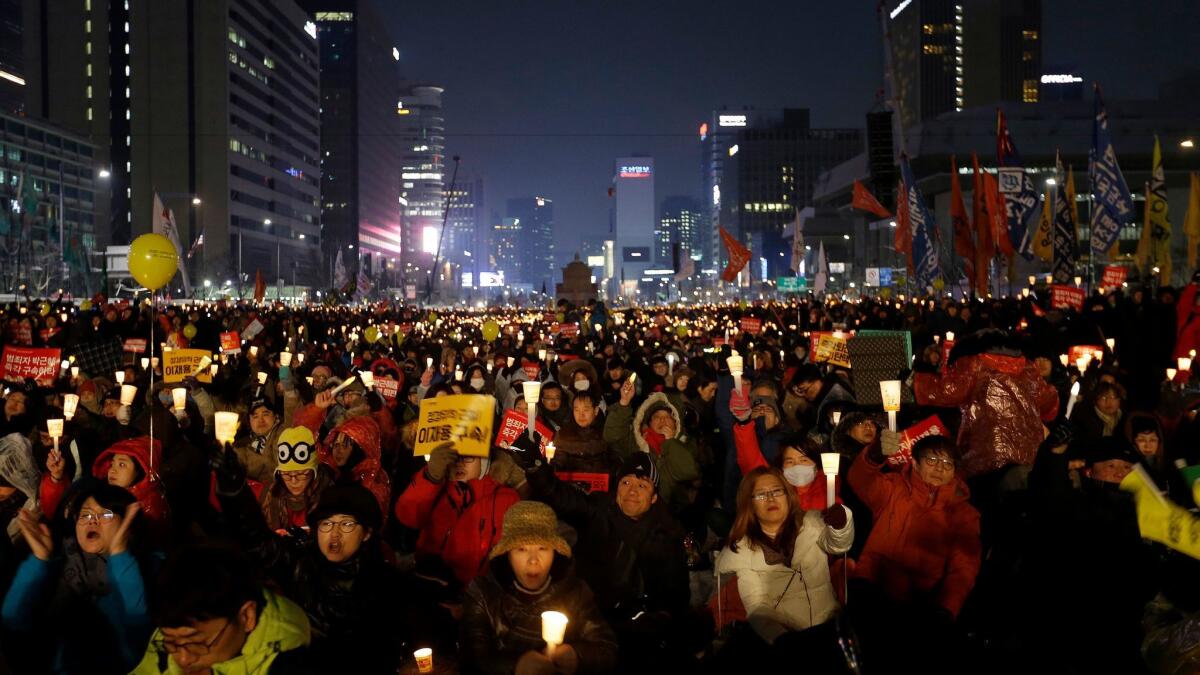South Korea’s president is expected to face prosecutors in coming days

- Share via
Reporting from Seoul — It was a high-stakes clash of executive power versus the rule of law: Prosecutors stood at the gates of South Korea’s Blue House, where the president lives and works, demanding entry to carry out a court-approved search warrant.
For the second time in recent months, aides to impeached President Park Geun-hye said no.
The president’s staff eventually relented, agreeing to turn over the requested information voluntarily. But the hours-long standoff at the Blue House gates last week exemplified the drama that has been unfolding in one of Asia’s leading democracies.
“We’re getting to a stage where she’s having to respond,” said David Kang, an international relations professor at USC who directs the university’s Korean Studies Institute. “It’s mind-boggling that they would say, ‘No, you can’t come in. But they are.’”

South Korea’s President Park Geun-hye speaks during an address to the nation at the presidential Blue House in Seoul on Nov. 4, 2016.
The sprawling investigation into South Korean political corruption that led to Park’s impeachment could take yet another twist in the coming days as the president is expected to face questioning by prosecutors.
The prosecutors have implicated Park, who was impeached in December, in bribery and other crimes as part of a broader influence-peddling investigation that has ensnared figures from the highest levels of South Korean politics and industry.
Since the impeachment, Park’s presidential duties have been suspended while a constitutional court in a separate proceeding decides whether to remove her permanently. The stakes in the scandal were high already, but events in recent days have ratcheted up the pressure, with key deadlines looming that could decide her fate.
Legal and political observers say time could be running short if Park wants to fight to keep her job — and perhaps avoid the threat of criminal prosecution.
“There was a sentiment that she needed to do something, whether it’s to provide more access or speak to prosecutors,” said Jonathan Kang, an associate professor of law at Yonsei University in Seoul.
On Sunday, Park finally responded to the host of charges that led to her impeachment, denying them all in a letter to the constitutional court, which could decide as early as next month to remove her. She has thus far declined to testify before the court, however.
The details of the planned encounter so far remain a mystery. Park’s lawyer did not respond to a request for comment and a spokesperson for the prosecutors said the plans were in flux.
As Park prepares to sit with prosecutors, her office has worked to stymie their attempts to personally collect her records. A court granted them a search and seizure warrant granting access to presidential documents from the Blue House’s security, medical and chief aide’s offices.
That led to the standoff at the gate Friday. Blue House officials said the facility is exempt from such searches, under a provision in South Korean law, because it contains classified military documents. The country’s acting leader, Prime Minister Hwang Kyo-ahn, a Park ally, said he could not intervene.
A separate team of local prosecutors had been denied entry to the compound in October, when the case first began to unfold.
In addition to the documents being sought inside the building, the prosecutors already have access to several detailed notebooks kept by a former presidential aide who has been interrogated during the investigation.

Choi Soon-sil, center, the jailed confidant of impeached South Korean President Park Geun-hye, shouts upon her arrival at the office of the independent counsel in Seoul on Jan. 25, 2017.
The influence peddling investigation centers on Park’s longtime confidant, Choi Soon-sil, who remains jailed on accusations that she used her influence to extort millions of dollars from South Korean businesses to enrich her own businesses and support her daughter’s equestrian sports career.
South Korea is no stranger to presidential scandal involving influence and corruption, and several presidents have left office under a cloud in recent decades. But this case, which had salacious details about cult leaders and pricey dressage horses, has captured the public’s attention.
The scandal led to street rallies in which millions of South Koreans crowded central Seoul and other cities to call for Park’s ouster. It has also roiled presidential politics as Koreans look ahead.

Choi, who did not work in the government, has also been accused of having improper access to sensitive records, such as drafts of presidential speeches.
In her letter to the constitutional court, Park reportedly referred to Choi as a common “housewife,” implying that the president was unaware of her business activities.
So far at least two presidential aides, two Cabinet ministers, a music video director and the heir-apparent to the Samsung empire have been accused by prosecutors of various crimes.
In addition to the corruption allegations, Park’s former presidential chief of staff and a culture minister, in custody for a month, were indicted on charges that they coordinated a blacklist of South Korean artists deemed unfriendly to Park’s conservative administration.
As many as 10,000 people were on the list of people denied state support. They including Park Chan-wook, who directed the South Korean film “Oldboy,” and author Han Kang, winner of the Man Booker International Prize in 2016, according to the Korean news wire Yonhap.
Dozens of other people in Park’s orbit have faced the specter of public testimony, as have several of the chief executives of South Korea’s largest chaebol, a family-owned conglomerate that has a huge influence on the country’s economy.
The biggest of those corporate titans, Samsung Electronics vice chair Jay Y. Lee, was accused of improperly directing more than $30 million to Choi’s businesses in an effort to win favor from the Blue House for a controversial merger between two of his company’s affiliates.
Samsung has denied the allegations, and a judge ruled that prosecutors had insufficient evidence to have Lee jailed as his case progresses.
Under their appointment, the prosecutors have until Feb. 28 to wrap up their work, though they are considering asking for an additional month — perhaps, in part, because of the denial at the Blue House.
“At the moment we don’t think there has been quite enough progress,” said Lee Kyu-chul, the prosecution spokesman. “So we are looking positively at the option for an extension.”
Observers say the real drama in Park’s case is at the constitutional court, where the judges are holding a trial that could drag on into early summer to decide her fate. But many believe the decision could come much earlier.
Park currently enjoys presidential immunity that would evaporate were she to be removed from office.
“We’ve got a few weeks left, really, if she’s going to show that she’s going to cooperate,” said Kang, the law professor. “We’re running out of time.”
Stiles is a special correspondent.
ALSO
Amnesty International accuses Syria of hanging thousands of prisoners, dumping bodies in mass graves
More to Read
Sign up for Essential California
The most important California stories and recommendations in your inbox every morning.
You may occasionally receive promotional content from the Los Angeles Times.














